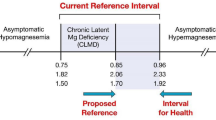Abstract
Purpose of review
Disorders of magnesium are reasonably prevalent, yet under-identified. We review how the kidney and gastrointestinal tract maintain normal magnesium homeostasis and the contexts and illness that may disrupt magnesium balance. We also suggest an approach to the evaluation, diagnosis, and management of magnesium disorders, with an emphasis on genetic etiologies that have helped to elucidate normal renal homeostatic functions and reveal mechanisms of disease.
Recent findings
Research is ongoing and continues to reveal new mechanisms of gastrointestinal and renal magnesium transport and regulation. We discuss some of the more recently identified genetic mechanisms of renal magnesium wasting and dysregulation.
Summary
Magnesium is an essential cation, needed for hundreds of cellular functions. Magnesium disorders may be due to either altered intake or gastrointestinal magnesium absorption or impairment of renal tubular magnesium handling. Recognizing the symptoms, risks, and co-morbidities for disorders of magnesium may help identify, diagnose, and manage groups of patients with increased hospital morbidity and mortality. Research continues to explore and clarify our understanding of mechanisms for the regulation of the total body and plasma magnesium. Additional clinical research is needed to link therapy and treatment goals with clinical outcomes.

Similar content being viewed by others
References and Recommended Reading
Papers of particular interest, published recently, have been highlighted as: • Of importance •• Of major importance
Martin KJ, Gonzalez EA, Slatopolsky E. Clinical consequences and management of hypomagnesemia. J Am Soc Nephrol. 2009;20:2291–5. https://doi.org/10.1681/ASN.2007111194.
Barton CD, Pizer B, Jones C, Oni L, Pirmohamed M, Hawcutt DB. Identifying cisplatin-induced kidney damage in pediatric oncology patients. Pediatr Nephrol. 2018;33:1467–74. https://doi.org/10.1007/s00467-017-3765-6.
Yang L, Frindt G, Palmer LG. Magnesium modulates ROMK channel–mediated potassium secretion. J Am Soc Nephrol. 2010;21(12):2109–16. https://doi.org/10.1681/ASN.2010060617.
• Blaine J, Chonchol M, Levi M. Renal control of calcium, phosphate, and magnesium homeostasis. Clin J Am Soc Nephrol. 2015;10(7):1257–72. https://doi.org/10.2215/CJN.09750913. This study is one of the more recent reviews that thoroughly covers renal and GI homeostasis and regulation of magnesium balance.
•• Viering DHHM, de Baaij JHF, Walsh SB, Kleta R, Bockenhauer D. Genetic causes of hypomagnesemia, a clinical overview. Pediatr Nephrol. 2017;32:1123–35. https://doi.org/10.1007/s00467-016-3416-3. This is a recent study that discusses and introduces the genetic disorders of renal magnesium wasting and hypomagnesemia. It applies these disorders to our understanding of normal renal magnesium handling and the evaluation of disorders of magnesium balance. It summarizes and forms the basis of our current understanding of renal magnesium regulation.
Hoorn EJ, Zietse R. Disorders of calcium and magnesium balance: a physiology based approach. Pediatr Nephrol. 2013;28:1195–206. https://doi.org/10.1007/s00467-012-2350-2.
Knoers NVAM. Inherited forms of renal hypomagnesemia: an update. Pediatr Nephrol. 2008. https://doi.org/10.1007/s00467-008-0968-x.
• Corre T, Arjona FJ, Hayward C, Youhanna S, de Baaij JHF, Belge H, et al. Genome-wide meta-analysis unravels interactions between magnesium homeostasis and metabolic phenotypes. JASN. 2018;29(1):335–48. https://doi.org/10.1681/ASN.2017030267. This is a recent study that shares a model for uncovering additional genes and factors that influence magnesium homeostasis, and in doing so, introduces new possible associations and interactions. It also provides a helpful backdrop to our current understanding of genetic mechanisms of renal magnesium homeostasis and disorders.
Matos V, van Melle G, Boulat O, Markert M, Bachmann C, Guignard JP. Urinary phosphate/creatinine, calcium/creatinine, and magnesium/creatinine ratios in a healthy pediatric population. J Pediatr. 1997;131:252–7.
Bockenhauer D, Feather S, Stanescu HC, Bandulik S, Zdebik AA, Reichold M, et al. Epilepsy, ataxia, sensorineural deafness, tubulopathy, and KCNJ10 mutations. N Engl J Med. 2009;360:1960–70.
Author information
Authors and Affiliations
Corresponding author
Ethics declarations
Human and animal rights and informed consent
This article does not contain any studies with human or animal subjects performed by any of the authors.
Additional information
Publisher’s Note
Springer Nature remains neutral with regard to jurisdictional claims in published maps and institutional affiliations.
This article is part of the Topical Collection on Pediatric Nephrology
Rights and permissions
About this article
Cite this article
Weinstein, A.R. Evaluation and Treatment of Disorders of Magnesium Balance. Curr Treat Options Peds 6, 241–251 (2020). https://doi.org/10.1007/s40746-020-00204-5
Published:
Issue Date:
DOI: https://doi.org/10.1007/s40746-020-00204-5




